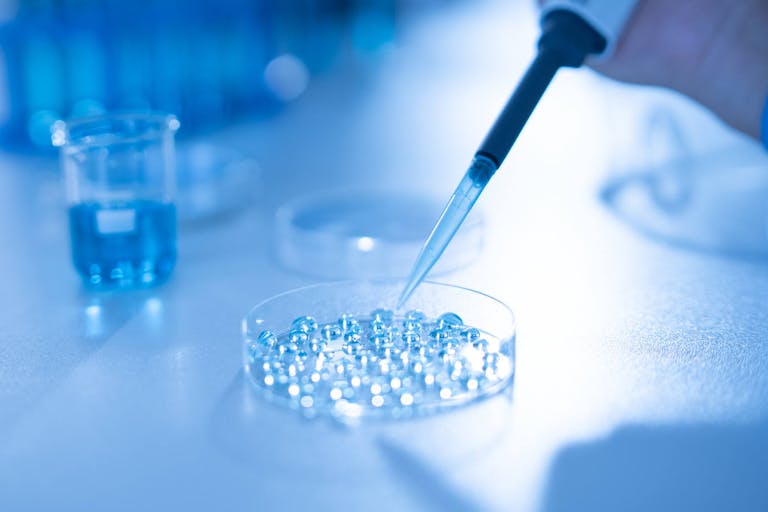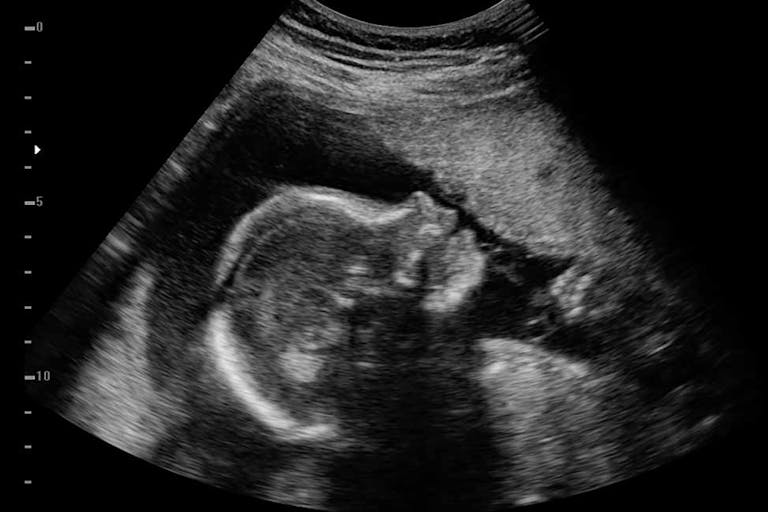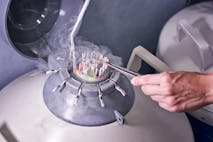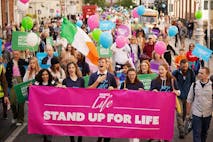
Research shows Catholic support for IVF declines once Church teaching is understood
Angeline Tan
·
International·By Nancy Flanders
BBC claims pregnancy centers in their ‘investigation’ lied to women. But did they?
In February, the BBC released its investigation into 57 pro-life pregnancy centers in the UK and the support they offer to women facing unplanned pregnancies. The media giant’s report, however, only promoted common lies regarding these pro-life organizations.
For the investigation, the BBC contacted the centers, posing as women who wanted to talk about their legal pregnancy options — including induced abortion, which directly and intentionally kills a living human being. Thirty-four of the centers directed the undercover BBC reporter to the NHS website or to an abortionist, while 21 of the centers gave the women advice on abortion.
The BBC then visited centers to attempt to capture the pro-life organizations manipulating women.
What it found was that these centers were giving women information on abortion trauma, as well as proven risks of abortion.
Abortion trauma
The BBC claimed that the centers lie to women about abortion trauma, saying that the condition is not recognized by the NHS. Statements from the pregnancy centers, according to the BBC, include that women can “suffer emotional disturbances,” and “walk out [of the abortion] a different person.” Some staff noted “nightmares” as well.
Research shows that abortion trauma is very real, and though it may not happen for every woman, it most certainly exists. The media does women no favors by pretending it doesn’t.
An October 2018 article in SAGE Open Med summed up four areas of agreement between pro-lifers and abortion advocates regarding abortion-related trauma. Researchers found that abortion is 1) “consistently associated with elevated rates of mental illness” compared to women who haven’t had abortions, 2) abortion “directly contributes to mental health problems for at least some women”, 3) certain risk factors like mental illness may put certain women “at greatest risk” of struggling after an abortion, and 4) it is “impossible” to “definitively identify the extent” to which abortion trauma can be attributed to the abortion alone.
Multiple studies support the conclusion that abortion significantly increases mental health risks. These risks include depression, anxiety, and substance abuse. And, yes, some women do report suffering from nightmares following an abortion.
In addition, there are thousands of women in online post-abortion support groups as well as in-person groups. The Silent No More Awareness website has more than 3,000 personal stories of abortion regret. Pregnancy centers have developed programs to help women overcome abortion trauma in response to women coming forward to ask for help, and some are even used in women’s prisons.
For the BBC to deny that abortion trauma exists is to discount the thousands of women who are suffering from the mental health effects of abortion and to imply that women speaking out are somehow misunderstanding their own emotions.
Avoidance of children
At Tyneside Pregnancy Advice Centre, the undercover reporter asked about what it means to experience “avoidance of children” after an abortion. The pregnancy center counselor replied, “Having the termination and feeling like maybe you shouldn’t be around children as a result.”
Studies and testimonials have revealed that a woman’s abortion can affect her relationships with her born children. One study found that 50% of women with abortion trauma were afraid they would be “punished” for their abortions by way of harm coming to their born children. Other women who suffered abortion trauma said they held back love from their born children and were scared to bond with them, fearing that if they loved those children “too much,” they would lose them.
On the flip side of that, 50% of the women said they felt the “compulsion to be a perfect mother.” This led them toward becoming helicopter parents, so afraid of harm coming to their children that they never let them out of their sight. Still, other women who suffered abortion trauma reported emotional and physical abuse towards their future “wanted” children.
In fact, a study in the Pre- and Perinatal Psychology Journal found that a history of abortion is associated with higher rates of child abuse. This is supported by three other studies.
Infertility
Some of the pregnancy centers warned of infertility from abortion, which the BBC claims is untrue. However, studies have shown that abortion can lead (and has led) to future infertility.
Surgical abortion is invasive and involves instruments used — sometimes blindly — to suction out or dismember the preborn child. Injuries are common, though only about half of U.S. states are even required to report such complications from abortion, leaving Americans ignorant of the true risks of abortion.
In May of 2020, late-term abortionist LeRoy Carhart “mangled” two women so badly that ER staff were left traumatized. One of the women was so badly injuried that a hysterectomy had to be carried out by hospital staff.
Though the abortion industry doesn’t announce the risk of infertility too loudly, it is certainly aware of it.
Right on Planned Parenthood’s own abortion consent form is listed “sterility” as a possible risk.
In addition, Maryland’s Gynemed Surgical Center abortion facility’s consent form also notes sterility as a potential side effect of abortion, in addition to complications such as a lacerated uterus, infection, perforation, and scar tissue — each of which can lead to difficulty becoming pregnant or the need for a hysterectomy.
Article continues below
Dear Reader,
In 2026, Live Action is heading straight where the battle is fiercest: college campuses.
We have a bold initiative to establish 100 Live Action campus chapters within the next year, and your partnership will make it a success!
Your support today will help train and equip young leaders, bring Live Action’s educational content into academic environments, host on-campus events and debates, and empower students to challenge the pro-abortion status quo with truth and compassion.
Invest in pro-life grassroots outreach and cultural formation with your DOUBLED year-end gift!
In addition, a woman who is Rh negative and whose partner is Rh positive is at risk of losing future children if she takes the abortion pill and does not receive Rhogam. During such a pregnancy, antibodies build up in the woman’s body that can cause the loss of future babies unless the mother receives injections of Rh immunoglobulin. With the new wave of no-test abortions for the abortion pill, women will not receive this necessary treatment.
Increased risk of breast cancer
Five pregnancy centers told the BBC that abortion increases a woman’s risk of breast cancer. Abortionist Lord claimed this is untrue and that the centers were telling women this to prevent them from having abortions. The problems with this are that 1) pregnancy centers have nothing to gain from preventing abortion since their services are free, while Lord profits from abortion and 2) there is serious controversy over this research — with multiple studies pointing to a possible link between abortion and breast cancer.
In her search for the facts about breast cancer, the pro-choice director of “Hush: The Documentary,” Punam Kumar Gill, discovered many facts about abortion and breast cancer that aren’t widely known.
One such fact is that women receive protection from breast cancer by having their first child before the age of 30 and by carrying their pregnancies to term. Dr. Angela Lanfranchi explained to Gill that by interrupting the pregnancy with an abortion or miscarriage before 32 weeks, “a woman has exposed her breast with more places for cancers to start…. And that’s why induced abortion increases the breast cancer risk.”
There have been several meta-analyses of peer-reviewed scientific literature since 1996, all substantiating a link between induced abortion and breast cancer.
In 2003, a relative handful of these authors gathered at the National Cancer Institute in a workshop (which excluded researchers who have long held to an association between abortion and breast cancer) to disavow their own data, yet never saw fit to publish retractions of those data in the journals in which they published. In 2009, some of those workshop participants, including its chair, Dr. Louise Brinton, who was chief of epidemiology at the National Cancer Institute, authored a paper in Cancer Epidemiology Biomarkers Prevention 2009;18(4). In that paper, they list induced abortion as leading to a 40% increased risk of all types of breast cancer (Table 1 of the paper). In the results section of this paper, the authors wrote, “In analyses of all 897 breast cancer cases (subtypes combined), the multivariate-adjusted odds ratios for examined risk factors were consistent with the effects observed in previous studies on younger women (Table 1). Specifically, older age, family history of breast cancer, earlier menarche age, induced abortion, and oral contraceptive use were associated with an increased risk for breast cancer.” (emphasis added)
What is noteworthy is that these authors published the same statistic that Dr. Brind found in his 1996 meta-analysis, and that they denied in their 2009 workshop. There have been no formal retractions of these data by any of the hundreds of authors of similar studies, or the editorial boards that published them. Read more here and here. Additional research on this topic can be found here, here, and here.
The National Cancer Institute denies a link between abortion and breast cancer, stating that all the studies that previously found a link were “methodologically flawed.”
Ultrasounds
The BBC also spoke with Ashleigh, a woman who contacted the pro-life group Stanton International after learning she was pregnant. She was already a mother to five children — and when she arrived at the pro-life facility expecting to get an abortion, the ultrasound revealed she was having twins.
“They said, ‘you have to look, these are your babies’ and when I finally turned to look, I saw two wee babies on the screen,” she said. “I wiped my own jelly off and left the room… That was enough for me.”
Ashleigh then had an abortion, and claimed she was traumatized by the ultrasound.
Lord criticized the use of ultrasounds at pregnancy centers, saying they can cause women to feel guilt. But in reality, ultrasounds are part of ensuring that women have truly informed consent before they make decisions about their pregnancy. It likely wasn’t looking at her babies that caused Ashleigh trauma, it was seeing them and then killing them.
Believing the liar
The BBC appears to have made no attempt to research any of the statements given by the pregnancy centers, instead relying on the word of an abortionist who financially profits from abortion sales for information.
“There is no increased risk of serious mental illness, infertility, or breast cancer after an abortion,” said Lord. “These centres are set up to target women who are struggling with their decision, and then give them false advice to try to sway them away from an abortion.

Rebekah Collins, founder of Hope Pregnancy center in the UK, responded to the BBC investigation. “We come alongside women in challenging pregnancy situations to provide a safe space to talk and find help,” she said. “Many women after abortion have told us, ‘No one offered me any hope.’ They ask, ‘Why did no one warn me?’ We want to be that source of information and hope for others.”
She said that while she cannot speak to what other centers do, Hope Pregnancy offers scientific information about fetal development as well as information on abortion procedures, including risks. They do not, she said, pressure women; rather, the women come to them feeling pressure to abort and they offer them encouragement to keep their babies.
If the BBC had turned to research instead of the opinion of an abortionist, perhaps it would have discovered the truth and helped countless women realize the true impact abortion can have on their lives. Women deserve better.
Editor’s Note: Special thanks to Dr. Gerard Nadal, Ph.D., for his contribution to the information presented in this article.
Live Action News is pro-life news and commentary from a pro-life perspective.
Contact editor@liveaction.org for questions, corrections, or if you are seeking permission to reprint any Live Action News content.
Guest Articles: To submit a guest article to Live Action News, email editor@liveaction.org with an attached Word document of 800-1000 words. Please also attach any photos relevant to your submission if applicable. If your submission is accepted for publication, you will be notified within three weeks. Guest articles are not compensated (see our Open License Agreement). Thank you for your interest in Live Action News!

Angeline Tan
·
International
Cassy Cooke
·
International
Angeline Tan
·
Politics
Stefano Gennarini, J.D. and Kelly Heilman, J.D.
·
Politics
Bridget Sielicki
·
Politics
Angeline Tan
·
Human Interest
Nancy Flanders
·
Politics
Nancy Flanders
·
Human Interest
Nancy Flanders
·
Politics
Nancy Flanders
·
Human Interest
Nancy Flanders
·